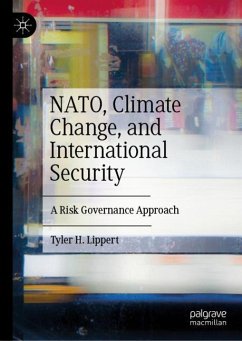This book offers a prospective analysis of the anticipated security consequences of climate change in relation to the North Atlantic Treaty Organization (NATO). Using climate and security literature to complement recent foresight and scenario analysis developed by NATO, the author applies the International Risk Governance Council's (IRGC) Risk Governance Framework to identify the considerations and actions that could assist NATO in a context where climate and environmental factors more intensively shape security. Tyler Lippert explores how climate change has the potential to increase the need for humanitarian assistance and disaster response, to create tension over shared resources, to renew and enhance geo-political interest in the Arctic, and to deepen concern with respect to the Middle East and North Africa (MENA). Within this new political and environmental reality, NATO must consider how to adapt to meet new demands, prepare for new security challenges, as well as manageunforeseen consequences.
Offering a corrective, this book identifies near-term actions for NATO to improve its risk governance posture, providing a basis upon which longer-range policy considerations can be developed. This analysis is only the opening salvo of what is likely to be a complicated process that spans many years, if not decades. However, in mapping the risk governance dimensions to the security and climate nexus from the perspective of NATO, Lippert provides a foundation for risk-based policy planning for NATO. The book will be of immense value to policy and decision makers: NATO leadership and its affiliated organizations as well as to academics across a broad span of subject areas, particularly environmental sociology, defense and foreign policy, and the political sciences.
Offering a corrective, this book identifies near-term actions for NATO to improve its risk governance posture, providing a basis upon which longer-range policy considerations can be developed. This analysis is only the opening salvo of what is likely to be a complicated process that spans many years, if not decades. However, in mapping the risk governance dimensions to the security and climate nexus from the perspective of NATO, Lippert provides a foundation for risk-based policy planning for NATO. The book will be of immense value to policy and decision makers: NATO leadership and its affiliated organizations as well as to academics across a broad span of subject areas, particularly environmental sociology, defense and foreign policy, and the political sciences.








